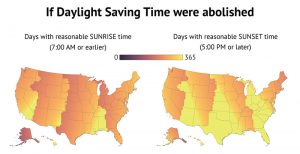The disadvantages of continuing the concept of Daylights Saving Time
The obligation of changing nearly every clock in your house, losing an hour of sleep, and feelings of drowsiness affecting your morning schedule: by the looks of it, the disadvantages of Daylight Savings Time outweigh potential benefits. For this reason, the plans future legislation to get rid of daylights saving time should not be overlooked, but encouraged. There are numerous petitions and movements whose main goal is to educate more and more people on why Daylight Savings Time is an unnecessary aspect of our lives.
According to “Time Well Spent: a Economic Analysis of Daylight Saving Time Legislation” by Steve P. Calandrillo and Dustin E. Buehler, “Over the last hundred years, Congress held numerous hearings, collected reports, and received testimony attesting to the benefits and drawbacks of shifting clocks.” The issue of daylights saving time has been a significant problem for Congress for many years, and progress to change current legislation is unfortunately a long and slow process. But if there is more action within organizations against Daylight Savings Time, it will become a more important issue within the government, and we might come closer to passing permanent legislation.
Currently, many students, including those of colleges, high school, and middle schools express clear discontent for setting the clocks ahead every year. Sleep is important for all students, especially when stress with homework and studying already cuts sleep time. Many feel it is a waste of time to set our clocks ahead and therefore have unwanted feelings of drowsiness and lethargy. Although researchers argue for the environmental benefits of daylights saving time, the never ending struggle of many people serve to be the main reason why it is in our best interest to outlaw daylights saving time…especially when we’re reporting to school at what our body things is 6:30 in the morning.





Sumbon Lawoti • Sep 25, 2019 at 1:36 pm
I support the message of this article, and I’m sure other students would as well. The fact that congress has been through many protests against Daylights saving time and yet it still exists is somewhat discouraging. However the hopes of getting a permanent legislation for daylights saving is great. It’s not just students in middle school, high school, or college who would benefit from this. I don’t doubt that Adults would enjoy not having to shift back the clocks as well. Great article with good facts that justify ending daylights savings time.
Caitlin Sullivan • Sep 24, 2019 at 7:34 am
I totally agree with you. Daylights Saving Time is more departmental then beneficial nowadays. Especially over the fact that the original reason for even having Daylights Saving Time was to make better use of daylight. So we change the clocks during the summer months to move an hour of daylight from the morning to the evening. Which now with alarm clocks and modern electricity there’s really no need to wake up early when we can use electricity to see later at night!